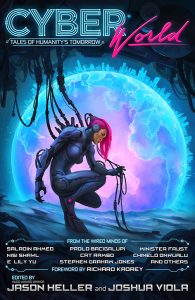Josh Viola Guest Post–“Cyber Punks”
Full disclosure: My story “wysiomg” appears in the forthcoming anthology Cyber World co-edited by Josh, but that wasn’t the motivation for this post, which covers the sort of material I would normally wish to bring to the attention of Locus readers.–Alvaro
One particular night a couple of decades ago officially branded me a cyber punk.
 I was about ten years old and hosting a sleepover in my family’s single-wide trailer. As you’re probably imagining, a sleepover in a trailer park can be a little unappealing, so I was feeling plenty of pressure to show my friends a fun time or they might never come back.
I was about ten years old and hosting a sleepover in my family’s single-wide trailer. As you’re probably imagining, a sleepover in a trailer park can be a little unappealing, so I was feeling plenty of pressure to show my friends a fun time or they might never come back.
Thankfully, I planned ahead. I had just the thing waiting for them in the living room.
When my friends finally showed up, they left their bikes on the porch and I led them inside to see the box.
My trailer was like any other in the neighborhood: linoleum floors, threadbare carpet, floral wallpaper, and faux wood paneling. But just then it was the most perfect place in the world because of the box.
One friend pointed and said, “Holy crap!”
Another said, “Oh my God, is that—”
“Exactly,” I said, swelling with pride.
We cracked open the box. We had to do it together; they’d have killed me if I’d opened it without them. Carefully, I pulled out a cardboard tray and removed a gray cartridge.
“Boys,” I declared, “tonight we’re playing Shadowrun.”
If you aren’t familiar, Shadowrun is sixteen-bit perfection: an early-nineties video game released on the Super Nintendo and Sega Genesis. Data couriers, evil AIs and enough violence to shame John Rambo. It was my first introduction to cyberpunk and, to this day, it is still one of my favorites.
Once the video cables were in place and a semi-static picture flickered on the television screen, we stayed up well past midnight saving Seattle from evil megacorporations. That night, I glimpsed a strange and different world. A world that’s much more recognizable and familiar today.
Several more experiences deepened my appreciation for cyberpunk. One was Akira, the closest thing I could imagine to an acid trip. The film was such a genuine sensory experience, I could literally smell the streets of Neo Tokyo. In that moment, Disney was out and Otomo was in.
Then I saw a little movie you may have heard about. It’s called Blade Runner.
Talk about flipping a switch in my skull.
The film came out about a year before I was born, but it showed me the future like an oracle. I was eleven when I saw it for the first time on my old sofa, a hand-me-down that carried the unmistakable scent of Grandma’s house. Despite its cheap, worn upholstery, that couch was the most comfortable thing in existence.
I remember the couch so vividly because, as I watched the movie, I realized how different Deckard’s world was to mine, and how badly I wanted to live in that film. My living room was cast in warm hues from frosted light bulbs and felt like some friendly, oversized terrarium. Blade Runner flashed with electric red, cobalt blue, neon yellow and phosphorescent green. Deckard’s reality seemed precision-cut by machines—foreign, beautiful, and adamantine. How could my soft, pastel existence compare?
The film was such an atmospheric experience that, to this day, when I visit new cities, I like to walk the streets at night, soaking in the glow and imagining myself inside Ridley Scott’s tech-noir universe.
So now I’m told that cyberpunk is passé?
Bullshit.
Cyberpunk isn’t dead. It’s changed, sure. Maybe it’s on the verge of a midlife crisis, trying to reinvent itself with an upgrade—preferably one that still commits to a pink Mohawk and safety-pin-festooned leather jacket. It’s re-making itself in the shadow of our new, distributed, global culture.
The cyberpunk future I knew, with its tropes of machine-mind interfaces, virtual realities and weak governments subsumed by a multi-national megacorp, seemed fantastic–much like today’s present.
Today, almost two decades into the new century, we live in a cyberpunk world where weak governments turn to corporate-backed mercenaries to supplement military forces. Where terrorist organizations are working to shut down the electric grid. Where hackers steal passwords and credit card numbers by the millions. Where computer viruses destroy businesses overnight. Where artificial limbs are controlled by impulses from the brain. Where virtual worlds grow ever more realistic, immersive, and affordable to the masses.
I wanted to assemble Cyber World, a cyberpunk anthology and companion soundtrack, out of a desire to reconcile the grit-and-neon aesthetic of the glittering eighties with the compelling and often frightening cyberpunk reality of the new century…and to extrapolate what “cyberpunk” might mean in the future.
With the help of my co-editor, Jason Heller, our fantastic writers—including Paolo Bacigalupi, Alyssa Wong, Cat Rambo, Alvaro Zinos-Amaro, Paul Graham Raven, E. Lily Yu, and many others—the synthwave sounds of Celldweller, and the art of Aaron Lovett, I believe we’ve captured something special. Perhaps even magical.
I hope Cyber World will transport other cyber punks into this retro-future, the better to appreciate and safeguard the world we have today.
About the Author

Joshua Viola is an author, artist, and former video game developer (Pirates of the Caribbean, Smurfs, TARGET: Terror). In addition to creating a transmedia franchise around The Bane of Yoto, honored with more than a dozen awards, he is the author of Blackstar, a tie-in novel based on the discography of Celldweller. He is the editor of the Denver Post number one bestselling horror anthology, Nightmares Unhinged, and has published Bram Stoker, Hugo and Nebula Award-winning writers. His next anthology, Cyber World, co-edited by Jason Heller, will be available this November. Blood Business, co-edited by Mario Acevedo, will be available in 2017. He lives in Denver, Colorado, where he is chief editor of Hex Publishers. He can be found on the web at www.joshuaviola.com





